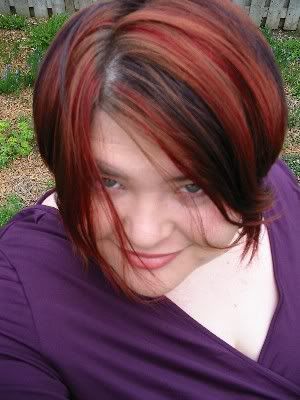my health
i figure you guys might want to know what's with all my weirdness of late (or you might not care, but you know, whatever...). well, a lot of it has to do with trying assimilate the recent discoveries of a couple of health issues. neither of them are particularily big deals i don't think, but i've never really ever had health issues before, so this is a new, and not pariticualrily welcome, experience for me.
First we have the 5 cm in diameter dermoid cyst (i found out i don't actually have to call it a tumor, that was a nice discovery) in my right ovary.
from a website called medicinenet:
Definition of Dermoid cyst of the ovary Dermoid cyst of the ovary: A bizarre tumor, usually benign, in the ovary that typically contains a diversity of tissues including hair, teeth, bone, thyroid, etc.
A dermoid cyst develops from a totipotential germ cell (a primary oocyte) that is retained within the egg sac (ovary). Being totipotential, that cell can give rise to all orders of cells necessary to form mature tissues and often recognizable structures such as hair, bone and sebaceous (oily) material, neural tissue and teeth.
Dermoid cysts may occur at any age but the prime age of detection is in the childbearing years. The average age is 30. Up to 15% of women with ovarian teratomas have them in both ovaries. Dermoid cysts can range in size from a centimeter (less than a half inch) up to 45 cm (about 17 inches) in diameter.
These cysts can cause the ovary to twist (torsion) and imperil its blood supply. The larger the dermoid cyst, the greater the risk of rupture with spillage of the greasy contents which can create problems with adhesions, pain etc. Although the large majority (about 98%) of these tumors are benign, the remaining fraction (about 2%) becomes cancerous (malignant).Removal of the dermoid cyst is usually the treatment of choice. This can be done by laparotomy (open surgery) or laparoscopy (with a scope). Torsion (twisting) of the ovary by the cyst is an emergency and calls for urgent surgery.
and then we have the poly cystic ovarian syndrome (PCOS). we'll go to a different site for that, we'll go to a US government women's heath site:
so, neither of them are *that* big a deal. but they're still throwing me for a loop. and i don't like it. bleh. blech. yuck. yucko. yucky.PCOS is a health problem that can affect a woman’s menstrual cycle, fertility, hormones, insulin production, heart, blood vessels, and appearance.
...
These are some of the symptoms of PCOS:
- infrequent menstrual periods, no menstrual periods, and/or irregular bleeding infertility or inability to get pregnant because of not ovulating
- increased growth of hair on the face, chest, stomach, back, thumbs, or toes
- acne, oily skin, or dandruff pelvic pain
- weight gain or obesity, usually carrying extra weight around the waist
- type 2 diabetes
- high cholesterol
- high blood pressure
- male-pattern baldness or thinning hair
- patches of thickened and dark brown or black skin on the neck, arms, breasts, or thighs
- skin tags, or tiny excess flaps of skin in the armpits or neck area
- sleep apnea―excessive snoring and breathing stops at times while asleep
...
Women with PCOS can be at an increased risk for developing several other conditions. Irregular menstrual periods and the absence of ovulation cause women to produce the hormone estrogen, but not the hormone progesterone. Without
progesterone, which causes the endometrium to shed each month as a menstrual period, the endometrium becomes thick, which can cause heavy bleeding or irregular bleeding. Eventually, this can lead to endometrial hyperplasia or cancer. [mainja: most of what i read says increased risk of uterus and breast cancer] Women with PCOS are also at higher risk for diabetes, high cholesterol, high blood pressure, and heart disease.
oh, and i guess i lied, since i do have chronic depression and i'm hypo-thyroid, which i guess are both health issues. go figure. funny, hadn't thought of that. hmmm, more to assimilate.

<< Home